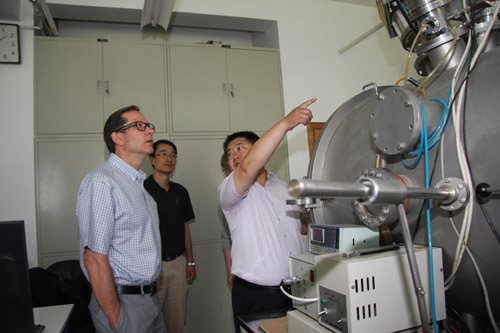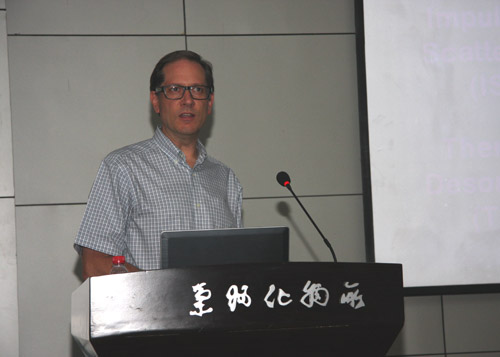In the lecture, Professor Timothy K. Minton introduced his group’s work in applying surface scattering technique in studying surface damage. The have applied molecular beam-surface scattering techniques in understanding the interactions between fast atoms or molecules and surfaces. At collision energies of many electron volts, non-equilibrium interactions become important. Such interactions may control the outcome of processes such as etching, surface-chemistry modification, and materials degradation on spacecraft. Their work is to understand fundamental gas-surface interactions in the regime of hyperthermal collision energies and to apply the knowledge gained to the solution of real-world problems.
Introduction of Professor Timothy K. Minton:
Timothy K. Minton is a Professor of Chemistry in the Department of Chemistry and Biochemistry at Montana State University, as well as a Visiting Research Fellow at the Dalian Institute of Chemical Physics (Dalian, Liaoning, China), Senior Editor for the Journal of Physical Chemistry A/B/C and an Associate Editor for the Journal of Spacecraft and Rockets. He is also a Fellow of the American Chemical Society and the American Association for the Advancement of Science. Prof. Minton earned his B.S. in Chemistry from the University of Illinois in 1980 and his Ph.D. in Chemistry from UC Berkeley in 1986. Following two post-doctoral positions, at the University of Illinois and at the University of Zürich, Switzerland, he became a Member of Technical Staff at the Jet Propulsion Laboratory in Pasadena, CA in 1989. In 1995, Prof. Minton moved to Montana State University, where he has built a program in molecular beam reaction dynamics. Specifically, crossed-beams and beam-surface scattering methods are used to study energy transfer and reaction dynamics at hyperthermal energies, with applications to materials and low Earth orbit chemistry. His current research projects include studies of gas-surface energy transfer and reactions on liquid surfaces, solvated electron reactions at liquid surfaces, and reaction dynamics of oxygen atoms with carbon clusters and carbon and ceramic surfaces. In addition to fundamental studies of gas-surface reaction dynamics, Prof. Minton actively participates in applied laboratory and space experiments to probe the durability of materials in space environments and to develop new and more durable materials for use on spacecraft.

In the State Key Laboratory of Solid Lubrication

Professor Timothy K. Minton is giving a lecture.

